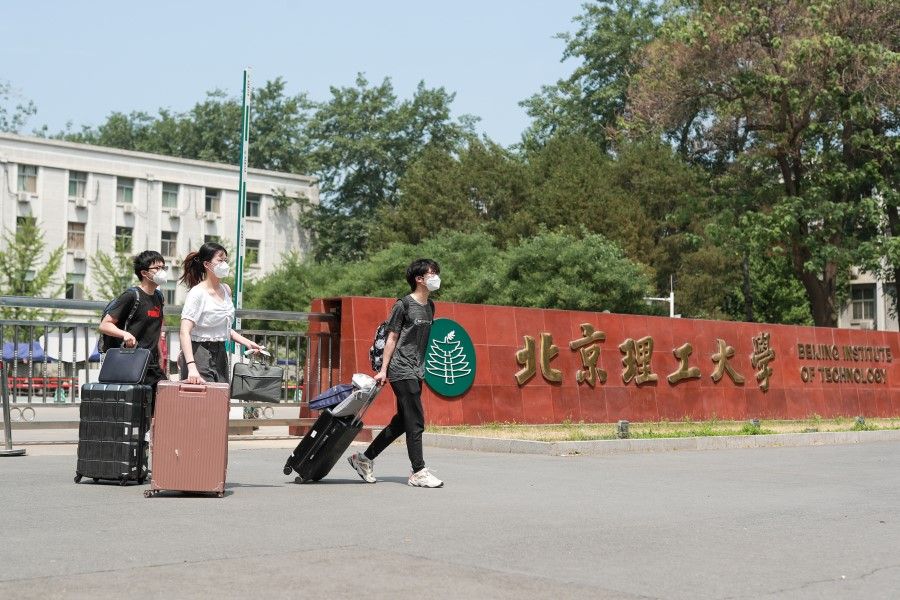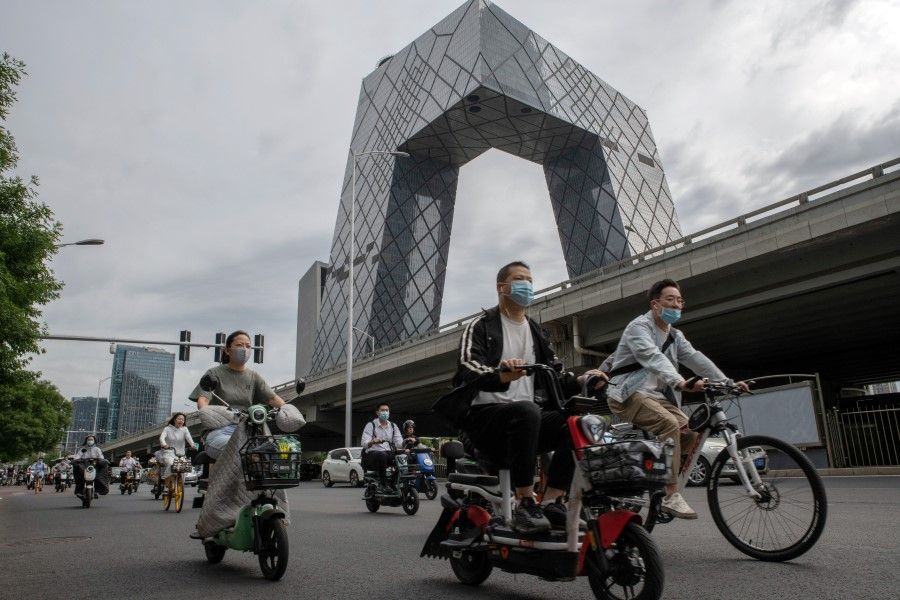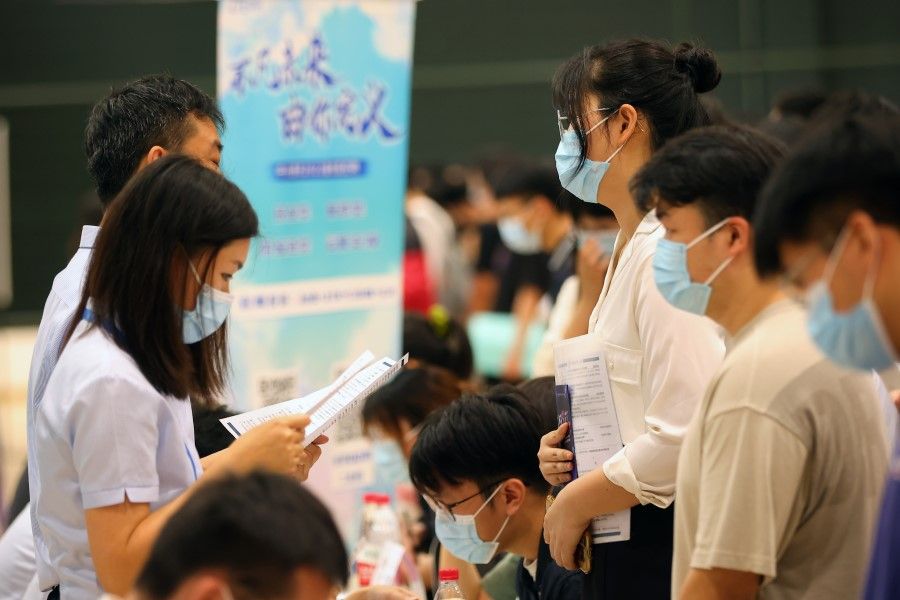Depression among China's college students reveals anxieties about jobs and Covid

(By Caixin journalists Huang Huizhao, Cai Jingyuan and Cai Xuejiao)
In the small six-bed dormitory, Dai Chang could only cry under her blanket to muffle the sound so as to not disturb her roommates. The student in Xi'an, Northwest China, had lost not only her daily routine, but also her appetite, a week after being sealed inside her college campus. She cried herself to sleep most nights.
Dai finally left for home 20 days into the campus lockdown, but her mental state did not improve. At home, she battled to suppress the urge to self-harm and often broke down in uncontrollable tears. She was admitted to a psychiatric unit in February and was prescribed medication to treat depression.

As Chinese cities battle the more contagious Delta and Omicron variants of Covid-19, colleges in cities including Shanghai and Jilin have imposed tough measures to keep the virus at bay, including sealing people inside their schools and dormitories. Even in regions that have reported few cases, universities have preemptively restricted free movement.
Dai ... could not experience the normal university life before the pandemic. She knew only about lockdowns amid local outbreaks, taking online classes, and lining up for Covid-19 swabs.
Dai was just one of many students around the world to have been badly affected by the Covid-19 control measures. In March, the World Health Organization reported that the pandemic was putting young people's mental health at higher risk.
Anxiety and depression are just the visible layers
With China's huge and growing number of students, the public health crisis had an enormous impact on a signification portion of the population. More than 28 million students were enrolled in China's universities and vocational colleges between 2019 and 2021. Combined with the number of current college students, the pandemic has affected about 60 million students in higher education institutions.
Mental health workers who spoke with Caixin noted that anxiety and depression were the visible layers of students' symptoms. They stressed the need to delve into the potential long-term effects of the pandemic by gaining a detailed understanding of college students' experiences. In particular, more needs to be done to find out how the pandemic had changed young people's perceptions, acquisition of skills and career choices, and the sort of challenges that might present themselves later on in the significantly affected young generation.
Dai, who enrolled in her university in Xi'an last September, could not experience the normal university life before the pandemic. She knew only about lockdowns amid local outbreaks, taking online classes, and lining up for Covid-19 swabs.
Several studies on college students have raised concerns that the group's mental health risks may be rising as disease control measures become the new normal.
Other students in Jilin and Shanghai also recalled their experiences of being confined in their dorms for weeks, feeling panic when new cases emerged at school and being hopeless about regaining free movement.
When the first local Covid-19 outbreaks occurred, universities and students had no inkling that the fierce battles to defeat the virus would last for months.

Chen Tong (psedonym), a university student in Shanghai, spent an average of ten hours a day on her phone during one particular week during the city's recent outbreak. News and requests for help posted on social media enveloped her like a spider web: the more she checked for information, the more depressed she felt, but the more she found that she could not look away.
Several studies on college students have raised concerns that the group's mental health risks may be rising as disease control measures become the new normal.
The key impact of the pandemic on students is the challenge to their sense of security and the need to rebuild it, according to Ling Chen, a Beijing-based college psychological counsellor.
... they were asked to suspend or withdraw from school because they had been diagnosed with or had a history of depression.

"The world used to be safe and controllable, but in the face of an unseen virus striking repeatedly, this sense of security may be compromised. All elements of safety, including how students build their lives, enter the workforce and explore their interests, could be impacted," Ling said.
The counsellor also suggested that universities should enact clear and scientific measures when responding to Covid-19 outbreaks. "Many students find themselves in a situation where the policy changes in a few days, and the changes are chaotic, which tends to lead to anxiety," Ling said.
Inadequate mental health support
In September 2020, the National Health Commission released a work plan on preventing and treating depression, including depression screenings for college students. However, after the document was released, college students took to social media to complain that they were asked to suspend or withdraw from school because they had been diagnosed with or had a history of depression.
Students were wary of seeking psychological help at their university, according to college psychological counsellors who spoke with Caixin. From the school's perspective, the primary goal of psychological intervention was to maintain campus stability. If a student were at risk of suicide or self-harm, the school tended to send them to the hospital or back to their families.
But for the students, the experience of being marked and watched affected their sense of personal privacy and left the impression that they were not being supported but instead controlled, increasing their desire to resist.
Yao Guizhong, former deputy head of the Peking University Sixth Hospital, noted that universities should not limit mental health work to psychological counselling, but should focus more on extending student support with broader psychosocial aspects.
"The number of professionals would never be enough if schools only seek to expand the team of psychological counsellors," Yao said. Other than counselling centres, students' unions could also organise online or offline events and encourage students to get involved in voluntary work in universities, he shared.
The key question remains whether students are being treated as "problems" or as people to be supported, said Yuan Yue, who has worked in college counselling.
"There is still a long way to go from focusing on the interests of the schools to focusing on the interests of the students." - Yuan Yue, who has worked in college counselling

"Campus mental health services often become administrative and bureaucratic, with some lectures organised or regular mental health reports required, which seem to cover a lot but bring little actual help," Yuan said.
Yuan added, "There is still a long way to go from focusing on the interests of the schools to focusing on the interests of the students."
Long-term impacts remain
As the pandemic strains education systems and the socioeconomic order, there are concerns over whether the pandemic will have a longer-term, more subtle impact on the development of students' self-perception, abilities and career choices.
Increasing numbers of young people in China have expressed a preference for public sector jobs as they seek maximum job security in the wake of the pandemic. A survey conducted by institutions including Fudan University's Social Governance Research Center found that the proportion of college students who wanted a state job increased from 33.6% in 2015 to 42.9% in 2020, with the proportion of those who sought to enter the civil service increasing from 5.3% to 12.4%.
According to Zhang Chenggang, labour economics associate professor at the Capital University of Economics and Business, the pivot towards conservative career choices came with increased competition for jobs and waves of private sector layoffs, and more importantly a growing disconnect between universities and society.
"Many students are not really familiar with the job market and do not identify their values before taking graduate or the civil service exams," Zhang said.
Yuan is also concerned that students' self-efficacy - a belief in their ability to accomplish something - is sinking. They have more negative expectations for the future, particularly in the job market, and they are more likely to doubt their ability to find a job, Yuan said.
"Students frequently express the feeling of 'powerlessness', particularly after experiencing lockdowns... This includes the feelings that claims will not be answered, that there is nothing to be done to change things, and that everything is volatile and insecure," Yuan added.
"We face a future with fewer options and greater uncertainty, and the pandemic continues to deprive and challenge the tools we use to cope with changes, such as social connections, academic and job opportunities, and even food and living environment." - A college student in Beijing

Amid the Covid-19 lockdowns, in April, China's urban unemployment rates surged to 6.1%, marking the highest figure since February 2020, according to the National Bureau of Statistics. The urban unemployment rate for 16- to 24-year-olds hit 18.2%, the highest of available figures since January 2018.
A college student in Beijing told Caixin that it was unfair to criticise college students for "lying flat", a buzzword used to describe the idea of doing nothing as a way to circumvent the pressures of modern urban life.
She shared, "We face a future with fewer options and greater uncertainty, and the pandemic continues to deprive and challenge the tools we use to cope with changes, such as social connections, academic and job opportunities, and even food and living environment."
"This is not about being melodramatic, it's our lived reality," she lamented.
The names of college students and counsellors are pseudonyms. Wu Danping contributed to this story.
This article was first published by Caixin Global as "In Depth: College Student Depression Hides Anxieties About Jobs and Covid". Caixin Global is one of the most respected sources for macroeconomic, financial and business news and information about China.
Related: Why is China obsessed with zero-Covid?, A burning issue among Chinese youths: How to escape the rat race?, Stolen identities: Imposters rob poor Chinese youths of their university dreams, Record 10.76 million Chinese university graduates face bleak job market and struggling economy, Nationalistic and patriotic? Chinese youths are more than that.
